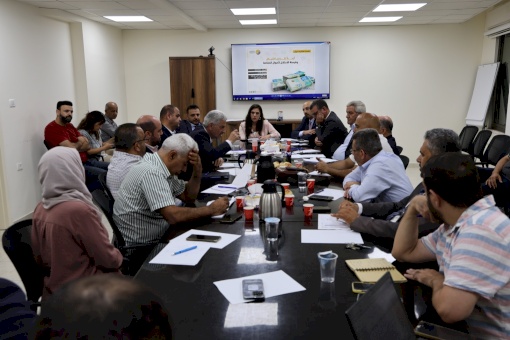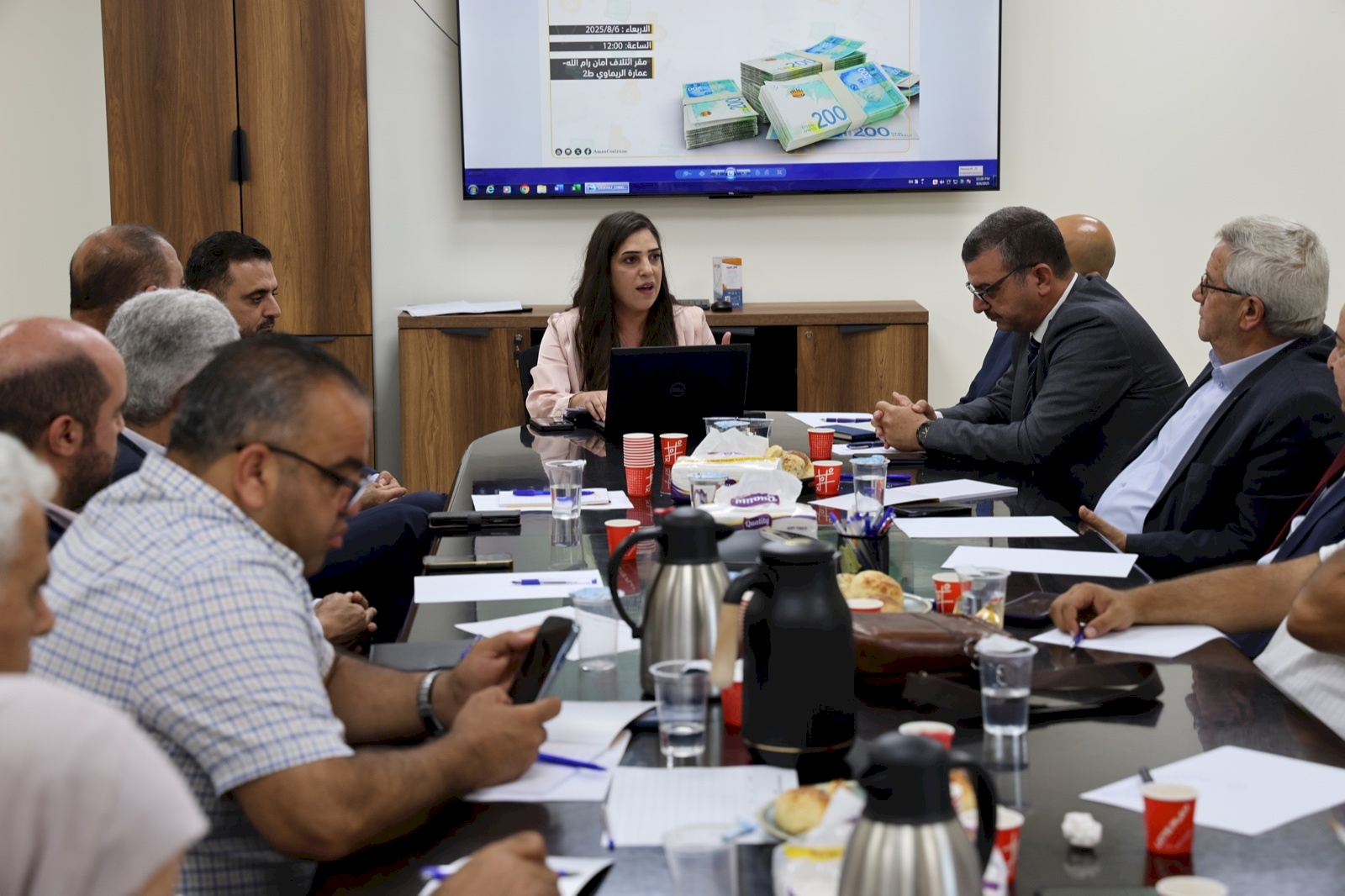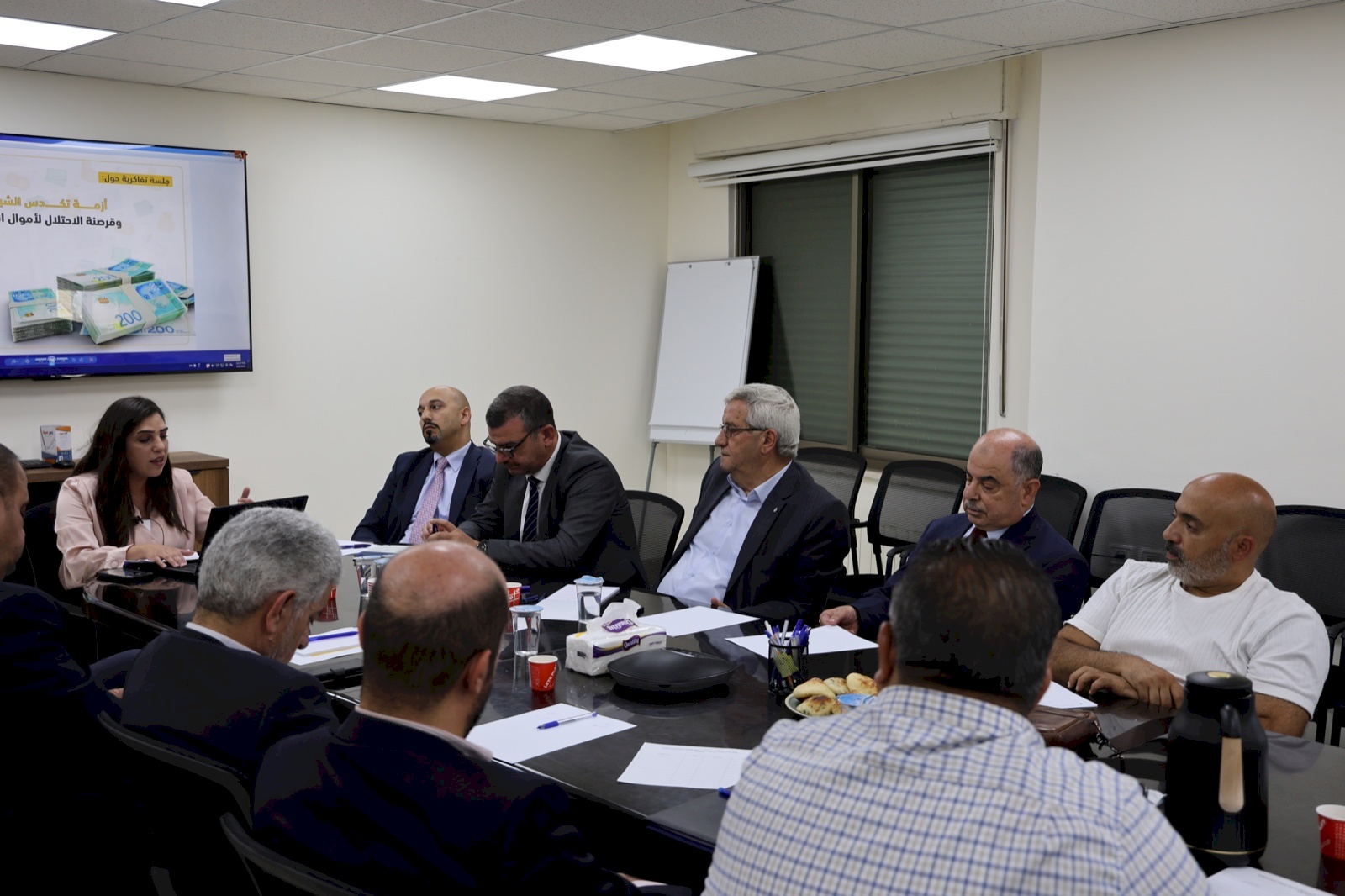
Aman Coalition discusses the shekel crisis and the piracy of clearing funds
Political reform is the necessary gateway that can subsequently lead to sustainable administrative and financial reforms
Ramallah – The Coalition for Integrity and Accountability (AMAN) held a discussion session on the crisis of shekel accumulation in Palestinian banks and Israel's continued piracy of clearance funds, with the participation of a group of experts and representatives from the Ministry of Finance, the Palestinian Monetary Authority, and relevant economic and banking institutions. The session aimed to diagnose the critical financial situation, develop practical recommendations to address the potential economic collapse, stop the financial bleeding, and push for radical solutions instead of merely temporary ones.
A recurring crisis: the occupation prevents the transfer of surplus shekels
The Palestinian economy faces a growing problem of shekels accumulating in banks for years, but the crisis has reached its peak with the extreme right-wing Israeli government, which has instructed the Israeli Central Bank not to accept surplus shekels beyond the annual quota set in 2018 at 18 billion shekels. With the increase in the money supply as a result of the development of the Palestinian economy, the surplus shekels that were not transferred reached approximately 30 billion shekels, prompting Palestinian banks to stop accepting deposits in shekels.
Serious repercussions for the economy and citizens
The shekel accumulation crisis has led to significant disruption in the work of Palestinian banks, which are no longer able to perform their role as effective financial intermediaries. This has damaged trade relations and pushed citizens to turn to the informal market to purchase hard currency, This has created a grey economy and a parallel black market, in the absence of a clear government strategy to control the flow of currency and direct it productively.
Palestinian-Israeli banking relations threatened with disruption
Since the signing of the Oslo Accords and the Paris Economic Protocol, Palestinian banks have become completely dependent on Israeli banks as financial intermediaries for foreign relations. The Israeli government has granted these banks legal cover through what is known as the ‘letter of guarantee,’ but it has recently threatened not to renew this cover, putting the Palestinian economy at risk of complete banking isolation and forcing the Authority to seek real alternatives to secure financial transactions.
Clearance funds: unchecked piracy
With the ongoing genocide in the Gaza Strip and escalating Israeli extortion, the piracy of clearance funds has reached its peak. The Palestinian Authority no longer receives these funds, which constitute about 65% of its revenues, after the amounts withheld by the occupation exceeded 8.2 billion shekels since 2019. The Palestinian government is also suffering from a huge public debt of 45 billion shekels, which has affected its ability to pay salaries to public employees (more than 245,000 people), causing a sharp contraction in the economy and a decline in purchasing power.
Measures to prevent the accumulation of shekels and turn the issue into an economic confrontation with occupation
The participants agreed on the requirements of the current phase, foremost among which is working on measures to prevent the accumulation of shekels again, by controlling unknown economic relations that increase the accumulation of shekels without knowing their source, This can be achieved through legislation or measures to require bank transfers for trade and financing in certain sectors with high monetary values, which constitute the largest component of the money supply.

Participants also recommended shifting the issue from mere financial crisis management to open economic confrontation with the occupation, through serious international action via courts, UN institutions and friendly countries to pressure Israel to release the frozen funds. At the same time, it is necessary to control public spending and develop plans to address the inflation of the payroll bill, settle pension fund debts, and stop unjustified appointments. The session also called for reforming the tax system to broaden the tax base without burdening taxpayers, applying value added tax in accordance with social justice criteria, combating tax and customs evasion, rotating employees, and encouraging early retirement in accordance with transparent criteria. At the strategic level, the importance of gradually decoupling from the Israeli economy was emphasised through supporting local production, replacing imports, expanding the productive base, moving towards alternative energy projects, and developing local revenues away from the control of the occupation.
Monetary Authority: The main problem is not cash but liquidity in correspondent accounts
Anan Samri, director of the Market Discipline Department at the Palestinian Monetary Authority, explained that the essence of the crisis does not lie in the accumulation of shekels as cash per se, but rather in the lack of liquidity in the correspondent accounts needed to supply vital goods and services, primarily foodstuffs. He warned that if banks continue to receive excessive amounts of shekels without careful risk management, they may incur significant losses due to exchange rate fluctuations, prompting them to take precautionary measures to protect their assets. Therefore, he called for refocusing the discussion on how to provide liquidity in shekels within correspondent accounts, rather than focusing solely on accumulated cash. He called for promoting the use of electronic payments to reduce and control the accumulation of shekels.
Mohammed Salama: The Monetary Authority and banks have deepened the crisis due to their shekel lending policy... and shekel inflation is an official responsibility
Financial analyst Mohammed Salama criticised the role of banks and the performance and policy of the Monetary Authority in dealing with the shekel accumulation crisis, considering that they contributed to complicating the situation instead of controlling it, adding that some banks are now lending more than they actually have, and have even started borrowing to continue lending, which reflects a serious flaw in risk management.
He also held the Ministry of Finance largely responsible for its consolidation of the shekel as the main currency in the financial system, which has reinforced people's reliance on checks and deposits in shekels. This is in light of a government policy that demands budgets in dollars but pays them in shekels, creating disastrous distortions, he said, especially given the cessation of banking relations with Israel and the need for banks to settle their obligations in other currencies. He also called for changing the way Palestinian banks operate and subjecting them to strict risk management assessments, stressing that regulating the banking sector is a necessity that cannot be postponed.
Afanaا: The Palestinian Authority has borrowed from all funds, in violation of the principles of good governance!
Mu'ayyad Afana, a member of the Civil Society Team for Supporting Public Budget Transparency, emphasized that the clearance crisis represents the greatest challenge facing Palestinians at the present stage. He pointed out that the transfer rate of clearance funds to the Palestinian Authority has reached 0% for the third consecutive month, forcing the public treasury to rely solely on limited domestic revenues, in addition to meagre external financial support that does not cover the minimum requirements. He noted that the Ministry of Finance has exhausted all available options, and that the Palestinian Authority has borrowed from all funds, in violation of the principles of good governance.
Afanah emphasized that, in light of the continued absence of clearance funds, the government will be unable to pay 70% of employee salaries under any circumstances, which requires urgent political and national action. He called for mobilizing the entire Palestinian leadership to address the clearance crisis, exerting effective pressure on friendly countries to provide emergency support, and seriously pursuing the establishment of a genuine Arab safety net. On the domestic front, he stressed the need to implement a strict austerity plan, beginning with eliminating most development expenditures and reducing operating expenses to a minimum. He emphasized that continuing to defer the financial crisis without real solutions means placing its full burden on the poor, with government work hours limited to no more than two days per week and a gradual collapse in the state's ability to provide basic services.

150% Cash Backlog at Gas Stations, E-Marketing Readiness Not Available
Osama Musleh, head of the Gas Companies Syndicate, explained that the financial crisis and the shekel backlog have had a severe impact on gas stations, with cash backlogs reaching 150% after banks tightened check returns and reduced facilities, leading to the accumulation of large amounts of cash inside stations. He pointed out that the sector, as a service provider, has begun cooperating with the Monetary Authority to implement electronic payment on a pilot basis in the gas sector. However, this system requires equipped staff and infrastructure that are currently unavailable. He emphasized that electronic payment fees do not even cover the cost of filling gas, shifting the crisis from the banking system directly to gas stations.
Musleh explained that dealing with the shekel backlog crisis requires practical solutions that begin by sorting through the various sectors and determining their needs and the extent of their reliance on checks or cash. He called for exempting certain sectors from the strict measures and granting them special exceptions, such as the fuel sector. Nizar al-Jabari, head of the Gas Stations Syndicate, expressed the worsening suffering of the sector in light of the liquidity crisis, stressing that banks are no longer accepting shekel deposits from gas stations, which is hampering their daily operations. He pointed out that the crisis has exceeded reasonable limits, calling on all relevant parties to assume their responsibilities and not leave vital sectors alone to face the accumulating economic repercussions.
Using the Jordanian Dinar as a Partial Substitute for the Shekel
Abi Aboudi, director of the Bisan Centre for Research and Development, pointed out that the ongoing discussions treat the financial reality as if it were separate from its political roots, while the reality in Gaza—where the cashing rate has reached 55%—reveals the depth of the structural crisis. He considered that the Palestinian economy's link to the shekel and to Israeli infrastructure, such as water, electricity, and other resources, is a direct result of the occupation, and that continuing with the current system without a thorough political review is what has brought the Palestinians to this stifling situation. He also called for an open discussion about the use of the Jordanian dinar as a partial alternative to the shekel, and the fact that some institutions already use the dinar. He emphasized the need to work with the Jordanian side to conclude agreements that support this transition. He concluded by warning of dangerous indicators related to the government's ability to continue providing basic services.
Dr. Nasr Abdel Karim: No banking solutions to the shekel crisis... Political reform is the only approach
Dr. Nasr Abdel Karim emphasized that the crisis of shekel accumulation in the Palestinian economy stems from two intertwined causes: the first is political, related to the occupation and the imposed economic relationship, and the second is banking, related to the behavior of banks and the Monetary Authority. He emphasized that any redistribution of burdens within the banking system will not end the crisis, but will only recycle it. He considered that there is no magic solution to this crisis, and that the key lies in controlling the channels through which the shekel enters the Palestinian economy, proposing strict restrictions on cash flows, including prohibiting the registration of any ownership or major transaction unless the funds are recorded in an official bank account. He stressed that addressing the clearance funds crisis, as well as the employee salaries crisis, cannot be achieved without genuine political reform, because technical and administrative solutions alone are incapable of addressing the root of the problem. He emphasized that political reform is the necessary gateway that can later lead to sustainable administrative and financial reforms that will save the Palestinian economy from falling into a vicious cycle of recurring crises.
Mesiyef Mesiyef: A Political Solution and Exports Are Key to Alleviating the Shekel Crisis
Economic researcher Mesiyef Mesiyef of the MAS Institute emphasized that the solution to the shekel hoarding crisis does not lie in technical solutions such as electronic payments, which reduce the cash surplus in banks but do not remove the surplus from the market or from citizens. He explained that the shekel accumulation in the Palestinian economy is primarily a result of the current trade structure, as Palestine relies heavily on imports and exports with Israel, in addition to the large cash flows from the occupied territories and Jerusalem. Masif emphasized that the real solution lies in changing the trade relationship with Israel and shifting the focus to increasing Palestinian exports to foreign markets, away from the Israeli market. This would contribute to injecting new cash liquidity and reducing reliance on the shekel, which is accumulating due to internal trade with the occupation.
Political reform is the necessary gateway that can later lead to sustainable administrative and financial reforms.
The session participants agreed that the shekel hoarding crisis has a political origin, resulting from the occupation's policies aimed at strangling the Palestinian economy and controlling its aspects. Therefore, any technical solutions, such as redistributing liquidity or moving towards electronic payments, will not address the root of the problem. Experts recommended launching an international pressure campaign to force the occupying state to receive its hoarded currency, demanding that the Palestinian Authority legislate oversight mechanisms to limit the circulation of the shekel outside official channels, and beginning to study the adoption of alternative currencies in the Palestinian market.
The participants also emphasized that the shekel crisis and the piracy of clearance revenues reflect a dangerous economic and political dilemma that threatens the structure of the Palestinian financial system and sets the stage for slow collapse unless radical measures are taken. The session provided a necessary space to discuss all challenges, emphasizing that the struggle for liberation must include liberation from the constraints of the Paris Protocol and from Israeli hegemony over the financial and economic aspects of life in Palestine. It was also emphasized that political reform is the necessary gateway that can later lead to sustainable administrative and financial reforms.
